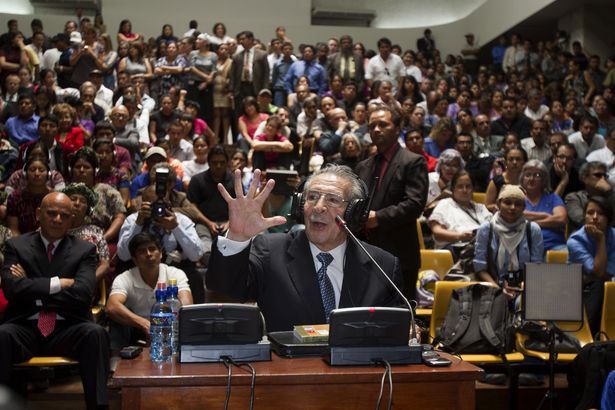Landmark Ríos Montt Verdict Overturned

Justice has suffered a heavy blow in the hemisphere as Guatemala restores its mantle as the home of some of the hemisphere’s worst human rights violators. The international human rights community stands in awe and deep disappointment at this setback. On May 20, 2013 Guatemala’s five-member Constitutional Court voted three to two to overturn the guilty verdict issued just 10 days earlier by the First High Risk Court against former dictator General José Efraín Ríos Montt. Ríos Montt was sentenced to 80 years in prison for acts of genocide and crimes against humanity committed against the indigenous Ixil people during his relatively brief period as head of state (1982-1983). This trial is extremely significant in that it marks the first time in history that a former head of state has been tried for human rights violations in a national court rather than before an international court and the first time that Guatemala has officially acknowledged that acts of genocide were committed during its 36 year civil war. No doubt the legal struggle to bring Ríos Montt to justice will continue as the prosecution regroups and adjusts its strategy to the new ruling.
Due to still pending legal challenges presented by the defense, the Constitutional Court overturned the earlier guilty verdict and ordered the trial to restart from its position as of April 19. The trial had been suspended from April 19 to April 30 after an earlier judge, Carol Patricia Flores, attempted to annul the trial’s entire proceedings. The Constitutional Court decided that Judge Flores had overstepped her authority and subsequently ordered the trial to continue, reportedly without addressing the appeals that had been submitted by Rios Montt’s defense. Additionally, the court also replaced Ríos Montt’s defense attorney, Francisco Garcia, after he stormed out of court on April 18. The defense argues that, on the one hand, court proceedings should never have resumed without addressing pending legal challenges and, on the other, its client’s legal rights were violated when a new legal team was appointed without his approval. Despite the resumption of the trial and the issuance of a guilty verdict on May 10, the Constitutional Court has now ruled that proceedings should have in fact been suspended in order to hear each appeal before the High Risk Court and that, consequently, the guilty verdict is now void with the entire process potentially having to begin again.
According to Grahame Russell, Co-Director of Rights Action (www.rightsaction.org), who is deeply involved with human rights work in Guatemala and who has been closely following the developments in the Ríos Montt trial, “the guilty decision is correct. [The decision and] the whole genocide trial, which goes back years, was the exception to impunity in Guatemala. The legal system as a whole is totally corrupted and keeps in place the system of impunity. It is not at all surprising that [the guilty verdict] has been partially turned back.” While this development is hardly surprising, it is extremely disheartening. Larry Birns, Director of the Council on Hemispheric Affairs observed, “this annulment tragically sends the wrong signal regarding the violation of human rights in Guatemala. If this action on Ríos Montt turns out to be a precedent, Guatemala is likely to again assume its traditional sash of being Latin America’s most violent human rights malefactor.”
Laura Powell, Research Associate at the Council on Hemispheric Affairs
Please accept this article as a free contribution from COHA, but if re-posting, please afford authorial and institutional attribution. Exclusive rights can be negotiated.
For additional news or analysis on Latin America, please go to: Latin News

